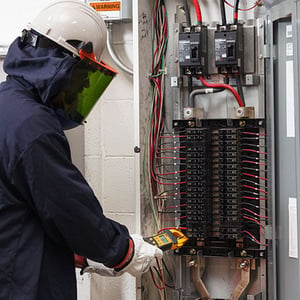When your business relies upon electrical power, the last thing you want is unplanned downtime due to equipment failure and power outages. Whether your business is industrial, commercial, healthcare, IT, financial, education, or any other industry -- power outages and equipment failures are costly and even dangerous.
There are several options that bring more reliability to electrical systems.
- Scheduled Maintenance for Equipment
- Back-Up Generators
- Uninterrupted Power Supply (UPS)
Scheduled Maintenance
The best time to perform maintenance on your equipment is before a failure. Smart owners schedule maintenance checks and servicing so that they can shut down work areas during times of inactivity or low activity. This is especially valuable for manufacturing, industrial and healthcare environments where a shutdown can mean a costly loss in productivity.
Scheduled maintenance checks by qualified electricians can identify aging equipment and even estimate the life span for critical parts. A qualified electrician can create an annual plan for part and equipment replacement that works around a production schedules or ensures reliability in healthcare and data systems. They will examine parts for wear and tear, and interview facilities professionals to understand the stress placed on equipment from production schedules, frequency of use, or load.
One way to check that stress is to use infrared scanning (IR Scanning). An IR Scan is done by a trained professional using a specialized camera that measures the heat signature in failing or compromised electrical parts. Then, predictions and recommendations can be made as to the lifespan of equipment affected by failing parts. Additionally, critical impending failures can be brought to the forefront to be corrected promptly.
Generators
Back-up generators turn mechanical energy into electrical energy and are widely used as auxiliary power sources. Essentially there are two types of generators -- AC (alternating current) and DC (direct current) -- that meet a wide variety of applications and locations with features such as portability, ruggedness, and size.
Generators can provide temporary power for construction sites or special events, standby power in the event of a power outage, and even daily power in rural or remote areas. Because generators take time to initiate, there is a period when no power is being delivered. In cases where power is critical, use of an uninterrupted power supply source is recommended.
Uninterrupted Power Supply (UPS)
A qualified electrician might suggest installation of an uninterrupted power supply system (UPS), a system of electrical circuits and sealed rechargeable batteries. A UPS uses AC power to charge the batteries and acts as a fail-safe in the event of a power outage. It will provide a short-term power supply for critical systems or bridge the gap of time it takes for a back-up generator to initiate. A UPS can come with surge protection or line filtering circuitry that protects the systems from weather related surges and prevents voltage inconsistencies.
A qualified electrician can recommend the right type of UPS with the capacity (voltage and amp-hour) rating to handle the load as needed. It is critical that the voltage rating match the requirements or the UPS battery or connected equipment could be at risk. There are three basic types of UPS systems.
- Standby UPS: This type of UPS will use its own battery to provide power to an attached device. Because it is attached directly to a power source, it will switch on only when it senses a lack of power, leaving a short window of interruption. These generally do not come with power surge protection.
- True UPS: Similar to the standby UPS, the online UPS pulls power from its own battery in the event of a power outage. However, because it is in an “always on” state, there is no power interruption. The unit simply continues on battery power until it either runs out or the power is returned. The battery acts as a surge protector.
- Line Interactive UPS: This type of UPS splits the power into both AC and DC current which both charges the battery and flows power to equipment and devices. This UPS allows for a steadier flow of current.
In addition to the three basic types of UPS systems, there are a wide variety of sizes, features and options that allow you to customize your UPS to a specific use, location and environment. A qualified electrician may suggest features such as remote access, cooling fans, muted alarms, special batteries, LCD control panels, and green technology. They may suggest options that manage environment, humidity, vibration, and temperature to meet your specific needs.
Protect Your Business Today
Lemberg partners with trusted vendors to find the best fit and price for our customers. For more information about Lemberg’s IR Scanning services, generators or a UPS for your specific needs, contact our Service Department at 262.781.1500.